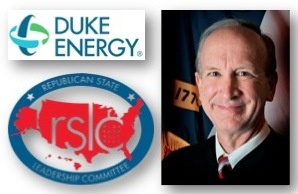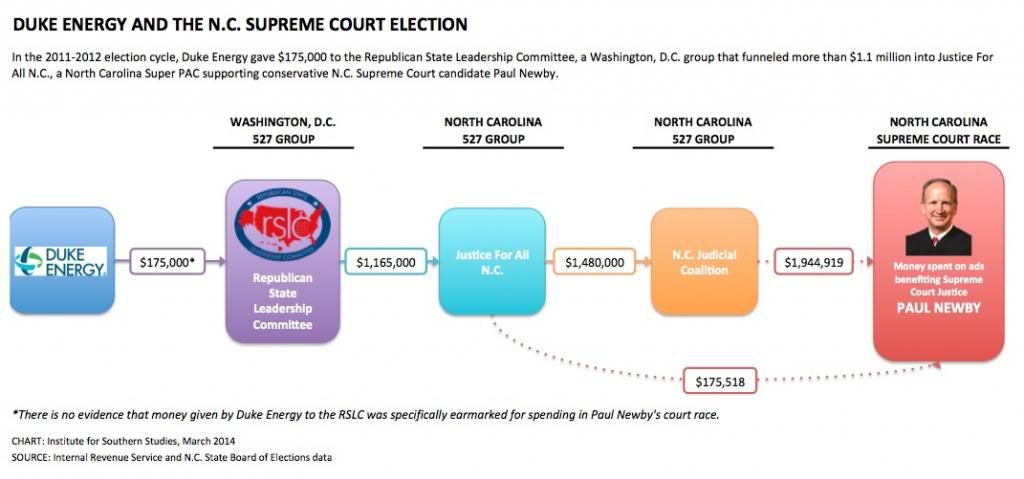Power and Justice: Duke Energy extends influence to NC courts

Duke Energy contributed generously to the Republican State Leadership Committee, and that super PAC in turn funneled money back into races for North Carolina courts that are key battlegrounds for the company.
In the wake of Duke Energy's massive coal ash spill in early February, which caused 40,000 tons of coal ash and 27 million gallons of ash-contaminated water to flood into the Dan River near Eden, N.C., activists and reporters have scrutinized Duke's cozy relationship with North Carolina lawmakers.
N.C. Gov. Pat McCrory (R), who worked for Duke Energy for 28 years, benefited from more than $1.1 million in direct and indirect support [pdf] from the company during his 2008 and 2012 campaigns, leading Bob Hall of the election reform group Democracy North Carolina to observe, "No corporation paid more to get Pat McCrory elected than Duke Energy." The company has also contributed well over $1 million to the campaigns of North Carolina legislators.
But Duke Energy's political influence extends beyond the governor's mansion and state legislature into another key battleground for environmental and other regulatory issues facing the utility giant: the North Carolina Supreme Court.
A Facing South/Institute for Southern Studies analysis finds that in 2012 Duke Energy contributed $175,000 to a super PAC in Washington, D.C. that ended up playing a major role in the N.C. Supreme Court race between incumbent Justice Paul Newby and challenger Sam Ervin, who serves on the N.C. Court of Appeals.
Outside groups not officially connected to Newby or Ervin poured more than $2.8 million into the 2012 state Supreme Court race, 90 percent of which benefited the Republican-favored Newby, who narrowly won with 52 percent of the vote, ensuring a 4-3 majority for Republican-leaning justices.
The Outside Spending Maze
A central player in the spending onslaught was the Washington, D.C.-based Republican State Leadership Committee, a so-called super PAC that is able to raise and spend unlimited amounts of money, as long as the group's TV ads and other electioneering aren't formally coordinated with the candidate.
According to state and federal election spending reports, Duke Energy was one of several North Carolina companies that contributed $100,000 or more to the RSLC in the 2012 election cycle, along with Lorillard Tobacco Company, Reynolds American, Time Warner Cable and Variety Stores, the retail chain owned by Gov. McCrory's budget director, Art Pope.
The RSLC funneled more than $1.1 million back to North Carolina in contributions to another super PAC based in Greensboro, N.C. called Justice for All NC.
Justice for All NC in turn spent more than $1.5 million to benefit Newby in the N.C. Supreme Court race, using two channels. First, Justice for All contributed $1.48 million to yet another North Carolina-based super PAC, the North Carolina Judicial Coalition, which became famous for its "banjo ads" in support of Newby. Second, closer to Election Day, Justice for All directly spent $175,518 on communications to benefit Newby.
The following chart prepared by Institute Research Associate Alex Kotch depicts the relationship between Duke Energy and the groups spending in the 2012 state Supreme Court race (click on image for a larger version):
While it's impossible to know if Duke Energy's contributions to the RSLC were earmarked to support the D.C. group's signficant investment in the North Carolina court race, the story highlights the confusing maze of relationships between companies and outside groups in the new election spending landscape.
A Stake in N.C. Courts
Whether or not Duke contributed to the RSLC with an eye towards the N.C. Supreme Court race, the energy company has a deep interest in the makeup of the state's highest courts.
This week, the N.C. Court of Appeals upheld state approval of the 2012 merger between Duke Energy and Progress Energy, which made the joined company the largest electric utility in the United States. One of the plaintiffs challenging the $32 billion merger, grassroots environmental group NC WARN, has vowed to appeal the decision to the state Supreme Court.
Also this week, a Wake County, N.C. Superior Court judge issued a 17-page order demanding that Duke Energy take immediate action to address coal ash hazards in North Carolina. If Duke decided to fight Judge Paul Ridgeway's ruling, the next stop would be the N.C. Court of Appeals, and after that the N.C. Supreme Court.
Duke Energy spokeswoman Erin Culbert said the company hadn't made a decision yet about whether to appeal, telling the News & Observer of Raleigh, "We're considering this ruling as we take another look at our management of coal ash basins."
Future of N.C. Courts in the Balance
As these and other cases involving Duke Energy drag on, key rulings will probably be made after North Carolina's 2014 judicial elections, in which seven N.C. Supreme Court and N.C. Court of Appeals bench seats -- more than in any other North Carolina elections in recent memory -- will be decided.
In 2014, substantially more money is expected to flow directly into the campaigns of judicial candidates. That's because for the first time in a decade the state's top judicial elections will happen without the state's "clean elections" program that provided public financing for candidates if they agreed to strict election spending limits.
A report from the National Institute on Money in State Politics found that North Carolina's judicial public financing program cut judicial campaign spending in half between 2004 and 2012.
The massive election overhaul passed by state Republicans in 2013 also raised the contribution limits for judges from $1,000 to $5,000. Last month, Art Pope announced a Raleigh Country Club fundraiser for N.C. Supreme Court candidate Judge Bob Hunter in which he pledged to make the new "maximum contribution" to Hunter's campaign. As Facing South reported, Pope himself was instrumental in dismantling North Carolina's judicial public financing program.
But even as judicial candidates receive more direct contributions, it's likely that super PACs and other outside spending groups will continue to play a key role. As Tom Fetzer, the former GOP state chairman who leads the N.C. Judicial Coalition super PAC, told The Charlotte Observer in January: "We plan to be very active [in 2014]. I think it's the most important state election in North Carolina."
What about the Republican State Leadership Committee, which points to North Carolina as one of its success stories and recently named N.C. Senate President Pro Tem Phil Berger to its national executive committee?
It hasn't announced if it plans to be as involved in North Carolina's critical 2014 court elections as it was two years ago. But if it again plays a role, it will have a boost from Duke Energy: According to IRS campaign finance records, Duke has already given $50,000 to the RSLC for the 2013-2014 election cycle.
Research provided by Institute for Southern Studies Research Associate Alex Kotch.
Tags
Chris Kromm
Chris Kromm is executive director of the Institute for Southern Studies and publisher of the Institute's online magazine, Facing South.

